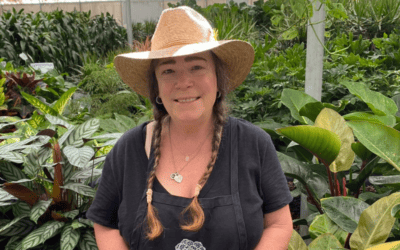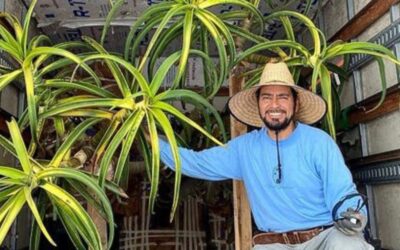Can You Use Garden Soil for Houseplants?
If you’ve got some garden soil leftover from this year’s gardening season, you might be tempted to use up the rest for repotting your houseplants. Soil is soil, right? Well, not quite! There’s a reason why potting soil is 2-3 times more expensive. Get the scoop on garden soil vs. potting soil for houseplants, so you don’t end up scooping the wrong stuff into your precious potted plants!

Garden Soil for Houseplants
The soil you use for gardening is fundamentally different from potting soil because they have varying purposes. The big bags of soil that you use in the garden are meant to be an amendment for outdoor use. You mix them into the dirt outside to improve moisture retention, drainage, and to introduce good bacteria. They’re usually made from a blend of native soil, manure, and bulky organic material like shredded bark.
Potting soil, on the other hand, doesn’t actually contain soil! Depending on the formula you choose, it’s usually a blend of potting mediums like peat moss, pine bark, vermiculite or perlite, limestone for balancing pH, and added plant food. Natural soil is full of minerals and microbes that feed plants, so the added plant food in potting soil makes up for the lack of nutrients.
Can You Use Garden Soil for Indoor Plants?
While it might seem like it can do the job, we certainly don’t recommend it! It isn’t as loose and airy as potting soil, so it can lead to root compaction and poor drainage in a container. This goes for both indoor plants and outdoor containers, so if you’re planning on putting some plants into a pot, potting soil is always the way to go!
Another important difference between garden and potting soil is sterility. Since the garden blends are full of microbes and bacteria, you probably won’t want to introduce that into your home. Potting soil is sterilized so there aren’t any microbes hiding in there, and alternative food sources are added to feed your plants, so it’s much more sanitary for indoor use.
The Best Soil for Indoor Plants
If you’re on the hunt for the best potting mix for indoor plants, you’ll still have some choices to make! Potting soil isn’t a one-size-fits-all kinda thing. After all, plants are a diverse group with different needs—your desert cacti and succulents are accustomed to sandy soil and hot, dry sun. But your tropicals are built to withstand rainy, humid climates under a canopy of rainforest trees.
By that logic, you’ll want to find a potting mix that’s specially formulated for the kind of plant you’re looking to pot up. While you can certainly buy all-purpose potting soils for some of the more common, easy-care indoor plants, some of the more specialized formulas will have better results in the long run.

Types of Soil for Indoor Plants:
These are some of the special soil blends you can expect to see on the shelf at the garden center. Depending on what you plan on growing in your containers, you should choose your mix accordingly, for faster, healthier growth, and happier plants overall!
- All-purpose potting mix
- Cacti and succulent potting mix
- Orchid bark mix
Many potting mixes also have fertilizer added in, often in the form of slow-release pellets. Usually, if you buy a special formula for a specific kind of plant, the correct fertilizer will be mixed in. However, if you use all-purpose potting soil, you may want to check what kind of fertilizers it contains and add in an additional formula if you’ve got a plant that’s a heavy feeder, like a dwarf citrus tree or a spider plant.
With spring on the horizon, your plants are going to need lots of room in their containers for their upcoming growth spurt! Visit OC Succulents to snatch up some premium potting mix for all your indoor plants and outdoor container plants, and while you’re at it, pick up a few fresh succulents to bring a little greenery into your home space!


